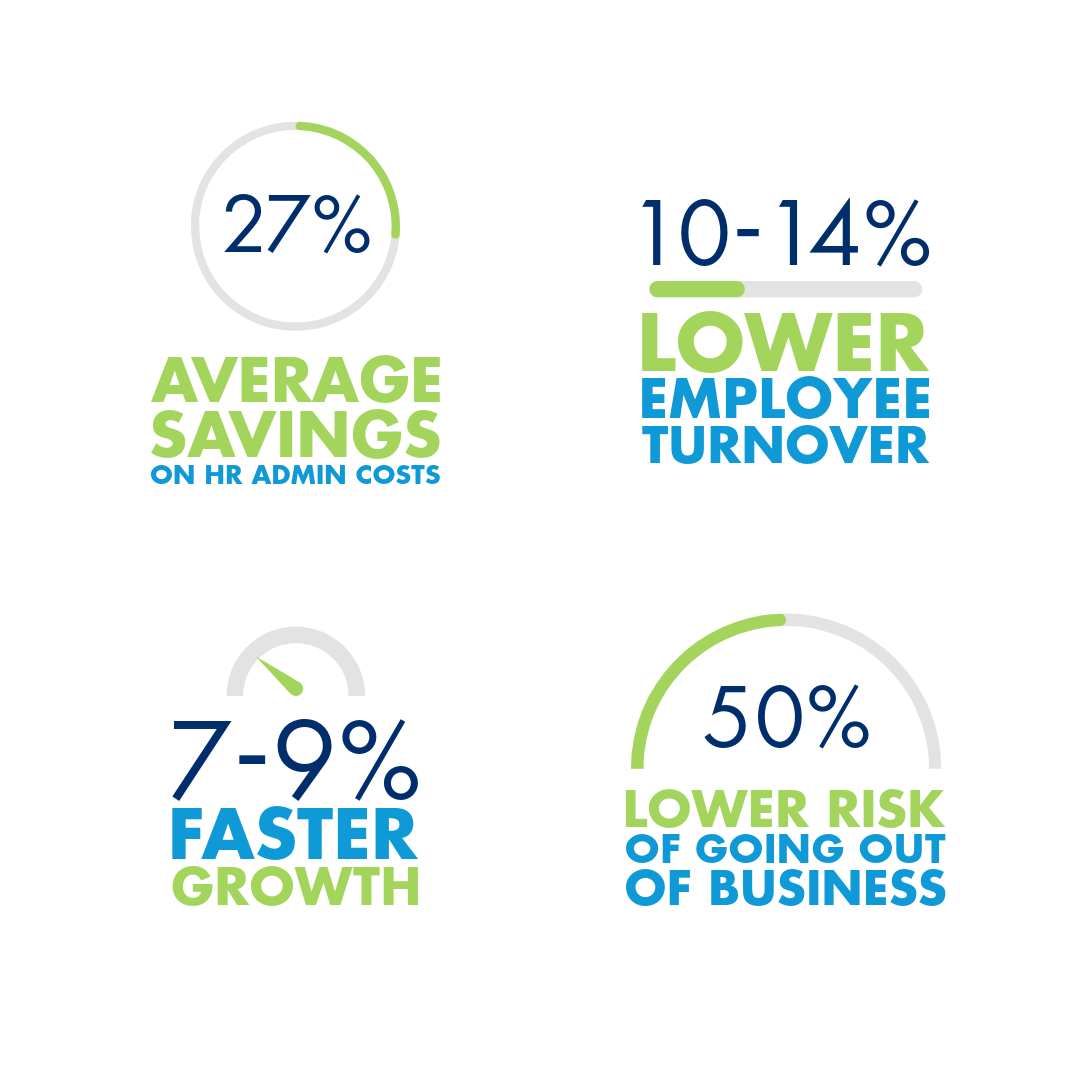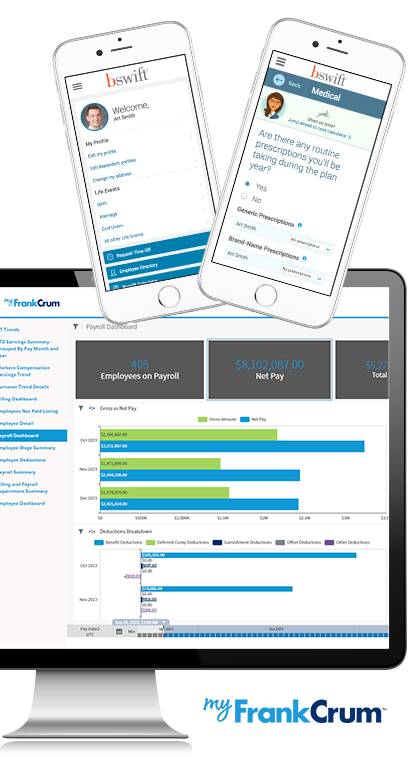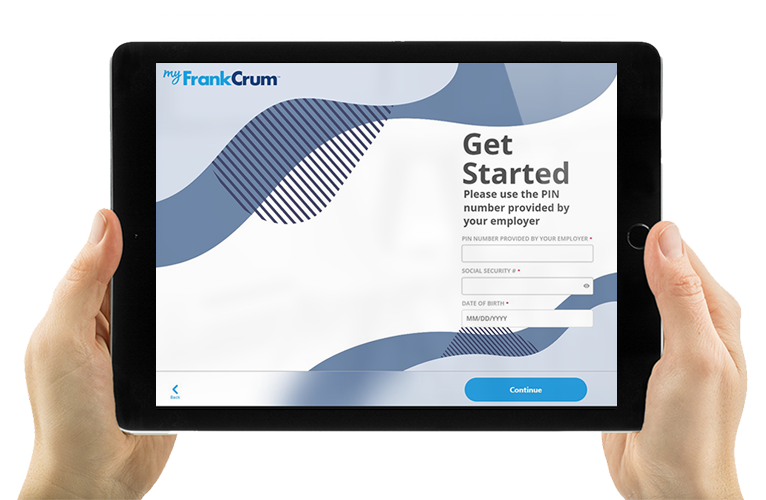A Comprehensive Guide to HR Outsourcing
-
What is HR Outsourcing?
-
Understanding PEOs in HR Outsourcing
-
The Role of Coemployment
-
How Does a PEO Work?
-
Comparing PEOs to Other HR Solutions
-
5 Tips for Selecting an HR Outsourcing Partner
-
How HR Outsourcing with a PEO Supports SMB Growth
-
Why Choose FrankCrum for HR Outsourcing?
-
Client Testimonials
-
Conclusion
What is HR Outsourcing?
Running a business is exciting, but let’s be real—HR tasks can be a major time suck. Payroll, compliance, benefits…it all adds up fast! That’s where HR outsourcing comes in. By definition, HR outsourcing refers to the practice of partnering with external HR experts to handle essential responsibilities, so you can focus on what you do best—growing your business.
So how does HR outsourcing work? It allows businesses to transfer HR functions—like payroll, benefits, and compliance—to a dedicated provider, ensuring efficiency and reducing administrative burdens.
For small and mid-sized businesses, the benefits of outsourcing HR go beyond convenience—it’s a game-changer. According to the Society for Human Resource Management (SHRM), small businesses spend an average of 54 hours a month managing HR tasks. That’s nearly 650 hours a year—time that could be spent building your business.
-1.jpg)
One of the most effective ways to outsource HR is through a Professional Employer Organization (PEO). According to a recent study by the National Association of Professional Employer Organizations (NAPEO), businesses that work with PEOs experience:

Sounds like a no-brainer, right? If you’re looking to streamline operations, reduce costs, and improve employee satisfaction, HR outsourcing with a PEO might be the perfect solution.
Understanding PEOs in HR Outsourcing
What is a PEO?
A Professional Employer Organization (PEO) is like your business’s HR best friend. But what is a PEO, exactly? It's a service that provides the most comprehensive form of HR outsourcing available to businesses today. Instead of just handling one or two tasks, a PEO provides end-to-end HR support, including payroll, benefits, compliance, and risk management. You receive the HR guidance you need from experts without the overhead costs.
How Do PEOs Work?
PEOs take on administrative HR functions like payroll processing, benefits management, and compliance oversight.
Beyond handling HR tasks, PEOs provide access to comprehensive employee benefits, advanced technology, and cost-savings advantages that would typically be out of reach for smaller businesses. They manage everything from employee onboarding and handbook creation to workplace safety and risk management, helping businesses stay compliant with employment laws while promoting a strong company culture.
Why Businesses Love PEOs:
According to NAPEO research, businesses partnering with PEOs save an average of $1,775 per employee annually, primarily through reduced administrative overhead and access to cost-effective benefits programs. This cost advantage becomes particularly significant for businesses with 1-50 employees, where internal HR administration can consume up to 25% of senior management's time.
The Role of Co-Employment
PEOs operate under a co-employment model, a model which often raises the question: What is co-employment? Simply put, it's a partnership in which the PEO handles the administrative side of HR while you stay in control of your employees and business decisions.
Under this arrangement, the PEO becomes the "employer of record" for tax and insurance purposes, while the company maintains full control over its day-to-day operations and workforce management decisions.

Co-Employment FAQs
Q: How does co-employment work?
A: For the duration of the co-employment agreement, the client company places its existing employees and subsequent hires on the PEO’s payroll for tax purposes. This practice is referred to as “employee leasing.” It enables the PEO to perform administrative duties on behalf of the client. At the same time, the employees continue to perform their work for the client company, as usual. Nothing changes in daily operations, but behind the scenes the client company has a wealth of support and expertise in play.
Q: As a business owner, what are my responsibilities within a co-employment agreement?
A: You continue to be responsible for business decisions, operations, and the management of your employees’ daily tasks and job functions. Although you remain responsible for compliance with labor and employment laws, your PEO will offer expert guidance to help you navigate this area.
Q: In a co-employment relationship, I’m responsible for managing my employees and complying with state and federal employment laws. How does a PEO support my human resource needs and help mitigate my risk?
A: First, the PEO will provide you with access to HR experts, knowledgeable in all aspects of labor and employment compliance. They will advise you on how laws are applied and interpreted, and best practices for hiring, employee training, and more. Before making a decision about an employee, you can schedule a consultation to discuss the circumstances and receive guidance.
You will also have access to a vast library of HR forms, documents, policies, and handbooks. Additionally, PEOs aim to keep clients current on changing federal and state legal regulations through ongoing communications.
Second, you will access Employment Practices Liability Insurance (EPLI) through your PEO. Like WC, the PEO holds one EPLI policy through which all employees on the PEO payroll are covered. It helps to cover expenses incurred by defending against employee claims of harassment, wrongful termination, discrimination, retaliation, etc.
Q: What is the PEO responsible for within a co-employment agreement?
A: A PEO takes responsibility for a variety of interlocking duties and their accompanying liabilities. Put simply, the PEO handles:
- Payroll processing and payroll tax administration
- Workers’ compensation and employment practices liability insurance
- Human resources support
- Employee health care, other benefits, and/or program administration (optional)
Q: How does a co-employment agreement impact my company’s payroll and taxes?
A: Your employees will become W-2 employees of the PEO and will be added to the PEO’s payroll. Federal and most state employer taxes will be reported and paid under the PEO’s tax ID number, and the PEO will be responsible for the administrative tasks underlying this function.
Comparing PEOs to Other HR Solutions
HR solutions have come a long way. Today, there’s a range of providers, each offering different levels of support and services. With so many options, it’s important to know what’s out there so you can choose what works best for your business.
Every HR provider wants to help make your life easier, but they don’t all do it the same way. Some focus on just payroll, while others offer full-service solutions with benefits, compliance, and risk management. Knowing the differences can help you make the best choice for the future of your business.
Modern HR challenges—like complying with labor laws, keeping employees engaged, managing risk, and staying efficient—require smart solutions. Businesses need to understand how different HR providers tackle these issues and what unique advantages they bring to the table. The right HR partner will not only take administrative tasks off your plate but also help you build a thriving, competitive business.
.gif)
PEO vs. ASO (Administrative Services Organization)
Let's focus on ASOs—they're basically your HR admin helpers. An ASO is a service provider that offers support with administrative HR tasks, such as payroll processing, benefits administration, and HR administration.
Unlike a PEO, an ASO does not operate under a co-employment model. Instead, ASOs are a practical option for companies seeking simple assistance with the administrative aspects of HR without outsourcing broader HR management functions.
While PEOs and ASOs might look similar at first, they work quite differently , and this can really affect how your business runs, your risk exposure, and your costs.
|
PEOs |
ASOs |
|
Establish co-employment relationships |
Operate as third-party administrators |
|
Share employer liability |
Leave all employer liability with the client |
|
Pool employees for better insurance and benefits rates |
Cannot pool employees to leverage economies of scale |
|
Provide comprehensive HR compliance support |
Provide limited compliance guidance |
|
Offer integrated payroll, benefits, and HR systems |
May offer separate systems for different services |
Now, you might be wondering whether to go with a PEO or an ASO. It really comes down to what you need. Think about how much help you want, whether you'd like someone to share the risks with you, and where your business is headed. Are you planning to grow quickly? Expand to new locations? These are the kinds of questions that'll help you pick the right fit.
PEO vs. HRO (Human Resources Outsourcer)
Now, let’s focus on HROs (Human Resources Outsourcers). These service providers help businesses manage specific HR functions by outsourcing them to external experts. Unlike PEOs, which offer comprehensive HR support under a co-employment model, an HRO focuses on individual HR tasks such as payroll processing, recruitment, or benefits administration. HROs are often used by companies that want support in particular areas of HR while maintaining direct control over others.
HROs have been around for ages, helping businesses delegate their HR work. But here's the thing—as managing employees gets more complicated and there are more rules to follow, the differences between HROs and PEOs become more apparent.
The distinction between PEOs and HRO providers is especially clear when considering risk management. PEOs generally offer stronger, broader compliance programs due to the co-employment model. Conversely, HROs only advise on compliance issues related to its narrow function. When considering data from the Competitive Enterprise Institute that shows businesses face an average of $10,000 in compliance costs per employee annually, the PEO model is better equipped to help mitigate these expenses than HROs.
|
PEOs |
HROs |
|
Single vendor for all HR needs |
Multiple vendors may be needed |
|
Shared liability through co-employment |
Client retains all employment liability |
|
Access to enterprise-level benefits |
Limited benefits options |
|
Dedicated HR consulting team |
Variable support levels |
|
Integrated compliance management |
Fragmented compliance approach |
For businesses weighing these options, the choice often extends beyond simple cost comparisons. While HRO providers can effectively handle specific HR functions, PEOs offer a more integrated and comprehensive approach to workforce management. The co-employment model unique to PEOs provides additional layers of protection and support that become increasingly valuable as organizations grow and face more complex HR challenges.
PEO vs. Payroll Providers
Payroll providers help make sure your team gets paid correctly and on time. They handle all the nitty-gritty like figuring out everyone's wages, taking out taxes, dealing with benefit deductions, and sending out pay stubs. Plus, they keep up with all tax rules and take care of important paperwork like W-2s and 1099s at the end of the year.
Payroll providers and PEOs are very different ways to handle your HR needs. Sure, running payroll might seem straightforward, but it's connected to tons of other HR stuff, like making sure you're following tax laws and managing benefits. A lot of companies start out just using a payroll service, but as they grow, they realize they need way more help than that.
Here's a reality check: the IRS says 40% of small businesses end up paying penalties (around $845 per year on average!) because they mess up their payroll taxes. This is where PEOs come in handy—they help you avoid these headaches with their comprehensive compliance guidance.
|
PEOs |
Payroll Providers |
|
Full payroll administration |
Payroll processing |
|
Tax management |
Basic tax filing |
|
HR compliance and risk management |
Limited HR support |
|
Benefits administration |
No benefits administration |
|
Highly scalable |
Limited scalability |
|
HR technology platform |
Time and attendance tracking |
|
Workers' compensation |
Limited compliance guarantees |
Think about where your company's headed and what kind of rules you need to follow when you're choosing between these options. Sure, payroll providers are great at getting those paychecks out, but there's a lot of other HR stuff they just don't handle.
As your company grows and things get more complicated—like managing your team, handling benefits, and following all those pesky regulations—having a PEO in your corner becomes super valuable. They don't just handle your payroll; they give you everything you need to grow your business without all the HR headaches, such as:
- Payroll processing and payroll tax administration
- Workers’ compensation and employment practices liability insurance
- Human resources support
- Employee health care, other benefits, and/or program administration (optional)
PEO vs. HR Platforms
So, what's an HR platform? It's basically a tech tool that makes all your company’s HR stuff easier to handle. Think of it as one big digital hub where you can manage payroll, benefits, getting new employees set up, keeping track of rules, and checking how everyone's performing. Instead of juggling a bunch of different systems, everything's in one place, which makes life easier.
Many of these platforms, like MyFrankCrum, have cool features such as self-service portals where your employees can log in to check their pay stubs, update their info, or look at their benefits without having to bug HR every time. Pretty handy, right?
These days, everyone's going digital with HR, and there are tons of these platforms out there promising to make managing your team a breeze. But here's the thing—while they've got nice features, HR platforms are totally different from what a PEO offers. PEOs typically combine a slick HR technology solution with actual human expertise backing everything up to provide complete HR services.
This becomes important when your company starts growing. Sure, HR platforms are functional, but at the end of the day, you may need HR guidance that goes beyond what software can provide. Technology can't handle everything on its own.
|
PEOs |
HR Platforms |
|
Full-service HR support |
Self-service tools |
|
Expert guidance and consulting |
Digital document management |
|
Proactive compliance management |
Basic compliance templates |
|
Dedicated service team |
Limited customer support |
|
Combined technology and human expertise |
DIY approach to HR management |
|
Significant cost savings through economies of scale |
No economies of scale for benefits or insurance |
The choice between an HR platform and a PEO ultimately comes down to your organization's need for human expertise and support versus a purely self-service, digital solution.
Think of PEOs as giving you the best of both worlds—they've got the tech you need, plus real people who know their stuff to help run your HR. It's like having a super-smart HR system AND a team of experts in your corner. This combo becomes handy when managing your team gets complicated—because sometimes you need both clever software AND actual humans to figure things out.
PEO vs. In-House HR
Should you keep HR in-house or team up with a PEO? Here's the deal: with traditional HR, you're handling everything yourself with your own employees. But with a PEO, you're basically getting a partner who shares both the responsibilities and risks of being an employer.
Working with a PEO comes with some serious advantages. Because they work with lots of companies, they can hook you up with benefits packages that would normally be too costly for smaller businesses to get on their own. Plus, they keep track of all those tricky federal and state rules, so you don't have to worry about messing something up. This is huge when you consider that fighting an employment lawsuit can cost a small business around $125,000!
Money-wise, it's a different ball game too. Running your own HR department means dealing with fixed costs and surprise expenses that can pop up out of nowhere. But PEOs usually charge by the employee or take a percentage of payroll, which makes it way easier to plan your budget and adjust as your company grows or shrinks.
Here's maybe the best part for small businesses: PEOs give you access to HR experts who know their stuff inside and out. Hiring all these specialists yourself would cost an arm and a leg. Instead of being limited by the knowledge of your in-house team, you get a whole crew of HR pros who are experts in everything from benefits to keeping your business legally protected.
5 Tips for Selecting an HR Outsourcing Partner
Small and mid-sized business owners looking to outsource HR functions should think critically about the decision. Here are five tips for selecting an HR outsourcing partner:

Define your business needs and goals. Before selecting an HR outsourcing partner, business owners should identify their primary HR challenges, such as payroll processing, compliance, risk management, or employee relations. It’s also important to consider where the business is headed and what HR issues you may confront in the future.
Prioritize compliance and risk management. Legal compliance is an ongoing concern for business owners. When selecting an HR outsourcing partner, consider those that will help you navigate complex labor laws and reduce risks associated with employment regulations, tax compliance, and workplace safety.
Leverage HR technology and data analytics. A strong HR outsourcing partner will provide access to modern HR technology, allowing you to track workforce data, analyze trends, and make better-informed decisions. Plus, automating administrative tasks through HRIS can also make your business far more efficient.
Evaluate customer support. A reliable partner offers responsive assistance, clear communication, and personalized solutions tailored to your business’s unique needs. This aspect of a business partnership is often the one that makes or breaks the relationship.
Consider long-term scalability. As businesses grow, their HR needs evolve. Partnering with an HR provider that offers scalable solutions ensures that HR services remain effective, whether the company expands operations or hires additional employees.
How HR Outsourcing with a PEO Supports SMB Growth
Thinking about teaming up with a PEO for your HR needs? It's actually a game-changer for small business HR and medium-sized businesses alike. Here's the great thing: when you work with a PEO, they become your partner in handling employer-related responsibilities. This arrangement provides businesses with access to better resources, improved processes, competitive employee benefits, broad business expertise, HR technology, and more.

Key Advantages of Partnering with a PEO
Save Time: One of the key PEO benefits is taking specialized, time-consuming administrative tasks off your hands. You’ll be freed up to concentrate on more important things like business performance and growth.
Attract & Retain Talent: Offer a sense of security by providing an attractive benefits plan typically offered to Fortune 500s, retirement options, and a safe work environment to employees.
Support & Guidance: Your company will receive reliable assistance and guidance from trusted advisors on a variety of specialized topics.
Save Money: You’ll reduce costs compared to doing things yourself and you’ll gain purchasing power for benefits, insurance, and other products.
Reduce Risk & Liability: Another PEO benefit is reducing workers’ comp claims with an effective safety program. Minimize costly mistakes in payroll and related taxes, benefits, and HR that can put your business at risk.
Consistently Compliant: Using a PEO helps take the burden of the ever-changing state and federal regulations off your shoulders.
Partnering with a PEO isn’t just about saving time—it’s about scaling smarter.

HRIS Technology
Let's talk about HRIS. An Human Resource Information System (HRIS) is a technology-driven solution that helps businesses manage and track HR-related data. HRIS platforms form the backbone of effective HR management, providing sophisticated tools that were once available only to large enterprises.
What's cool about HRIS is that it handles boring (but super important) stuff like payroll, benefits administration, employee records management, and compliance tracking. Gone are the days of drowning in paperwork or pulling your hair out over spreadsheets—this tech does the heavy lifting for you and helps avoid pesky human errors.
Here's where it gets even better: when you work with a PEO like FrankCrum, you get access to a top-notch HRIS system that integrates with your payroll and benefits. Plus, your employees will love being able to handle their own stuff through the self-service portal— they can check their pay stubs, manage their benefits, and request vacation time without having to bother HR about it.
Long story short: HRIS makes life easier for everyone, helps your business run smoother, and lets your team focus on what they do best instead of getting bogged down by paperwork.
Key HRIS Benefits
Streamlined Workflow Management
Data Driven Decision-Making
Enhanced Employee Experience
Compliance & Risk Management

SMB Success Stories
HR outsourcing through a PEO has proven to be a game-changer for many SMBs, helping them streamline HR functions and focus on core business growth. Here are a few examples of how PEOs positively impact small businesses:

Jake owns a small construction company that was struggling to keep up with changing OSHA regulations and labor laws. With expert compliance guidance and training resources from a PEO partner, he was able to improve safety protocols and reduce violations.

Kendra’s fast-growing tech startup lacked the internal HR infrastructure to handle its expanding workforce. By outsourcing HR to a PEO, the company gained robust HR technology, a streamlined onboarding process, and comprehensive benefits, helping to attract and retain top talent. Plus, she didn’t have to spend a penny on extra overhead.

Lee is the owner of a private medical practice. He wanted to provide competitive employee benefits without incurring excessive costs. With the help of a PEO, the business was able to access high-quality group benefits at reduced rates, improving employee satisfaction and retention.

Pari’s regional retail business faced hiring surges during peak season. Her PEO partner facilitated seamless onboarding and payroll management for seasonal employees, ensuring smooth operations without extra administrative burdens.
These stories demonstrate how SMBs across various industries benefit from HR outsourcing by improving compliance, enhancing employee benefits, and reducing administrative complexities. By partnering with a trusted PEO, SMBs can overcome HR challenges and position themselves for long-term success.
Download Our Free Smart Business Playbook
Learn how HR outsourcing with a PEO fuels small business growth with our free Smart Business Playbook: Cut Costs, Save Time, and Stay Compliant.

Why Choose FrankCrum for HR Outsourcing?
FrankCrum offers a comprehensive PEO solution that includes payroll, HR, workers’ compensation, employee benefits. But FrankCrum isn’t just any PEO— our commitment to service and expertise makes us a trusted choice among businesses searching for the best PEO providers. Here's what sets us apart:
Top-Tier Customer Service:
9/10 customer satisfaction rating and a 91% retention rate.
Personalized Support:
We tailor our HR solutions to fit your business, combining white glove service and innovative technology.
Real People, Real Answers:
No frustrating phone queues—just real humans ready to help.
AM Best-rated Workers’ Comp Carrier: We own our own carrier, providing discounts to businesses of all sizes.
40+ Years of Experience:
We’ve been helping businesses grow since 1981.

FrankCrum is dedicated to delivering the best PEO services by providing products and solutions that foster stability and security. With an operational philosophy of “do the right things for the right reasons” we are singularly focused on our customers’ success. That is the way we do business—one person at a time, one client at a time.
Client Testimonial
See what FrankCrum Customers Are Saying
Starting as a small business that has evolved into a much more robust business in six years, I could not hire any new people until we had a payroll platform that worked and would be an easy transition for our team. When we found FrankCrum, I could not believe how simple this transition was going to be. My employees are happy, the pressure of the payroll is off me now and I can focus on other important tasks within our business growth.
Renee R.
As a small business owner, I am always looking for good quality services to help support my business. FrankCrum goes above and beyond on all points. I love being able to leave my payroll in the hands of a trusted provider. It just doesn't get any better than this.
Chuck S.
We have been using FrankCrum PEO service for 5 years now and could not be more happy with them. The setup process was easy, and all the staff members were super helpful. Their services go way beyond payroll and workers’ comp - they offer background checks, help with hiring, and always send useful information for HR. I would recommend it to any small business!
Christina W.
FrankCrum has been my company's Payroll Service Provider, Human Resource Support, and Workers’ Comp Provider for over twenty years. I highly recommend this very professional, friendly and easy to work with company.